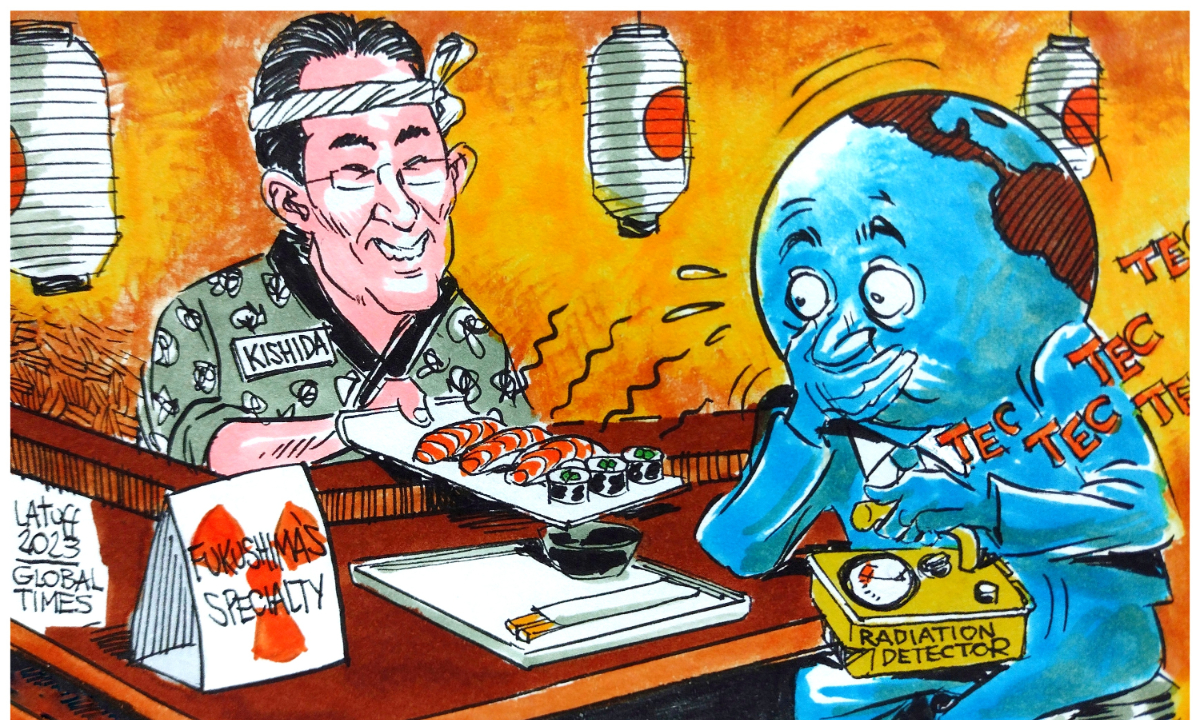
Japan's toxic dumping is feared to rattle the global food chain. Cartoon: Carlos Latuff
Chinese netizens have expressed shock over the behavior of the Japanese government - the culprit risking the future of the world by dumping nuclear-contaminated water into the sea - which is trying every effort by hook or by crook to whitewash its dangerous disposal of the Fukushima radioactive water and even
shift blame to China.
The topic "Japan is employing despicable means to
shift blame onto China" is trending on major Chinese social media platform Sina Weibo, where it has earned more than 340 million views as of press time.
There are always some things in the world that we may never see in our lifetime, including "Japan's heartfelt recognition of mistakes and crimes," Chinese observers mocked.
Experienced Japanese lawyer Etsuro Totsuka pointed out that the Japanese government has the tendency to not acknowledge any violation of international laws, which can be seen in their unilateral response to the September 18 Incident, which marked the outbreak of the War of Resistance against Japanese Aggression (1931-45). Until now, the Japanese side has not apologized for or reflected on their aggression, Totsuka told the Global Times.
The slump in goodwill toward Japan has not only been reflected in social media comments but also the Chinese attitude for Japanese tourism and cosmetics brands. Cancellations of tours to Japan have already begun, Chinese media has reported.
The public reactions came as a series of absurd reality show-type actions directed by the Japanese government have been staged recently amid strong worldwide concern over the dumping of contaminated water from the Fukushima Daiichi nuclear power plant.
Major Japanese and Western media outlets in the US-led camp rushed to the frontlines in highlighting the so-called anti-Japan sentiment in China, exaggerating the moves of a few Chinese citizens, including nuisance phone calls to Japanese enterprises and authorities. But these events were only from claims by Japanese government sources and their authenticity has not been established.
At Tuesday's press briefing by the Chinese Foreign Ministry, a reporter from AFP asked spokesperson Wang Wenbin whether China would call for its people to stay calm over the Japanese dumping issue, showing odd attention toward a tidbit of news that has not been verified in an apparent attempt to shift public focus after the Japanese government "threw a mine" into the sea that threatens the ecological environment of the world.
Wang stressed that China always protects the safety and legitimate rights and interests of foreigners in China in accordance with the law.
If Japan's push to release nuclear contaminated water into the sea is based on science, why is the opposition in Japan still so difficult to quell? What Japan should do is to immediately correct its mistake and stop the discharge of nuclear-contaminated water into the sea, rather than the opposite, Wang said.
As part of measures to fulfill China's promise, about a dozen Chinese police officers have been sent to guard the street in front of the Japanese embassy, the Global Times reporters saw at the site of the embassy.
Also at the press conference, Wang stated that China has lodged solemn representations with Japan over the nuisance the Chinese Embassy and consulates in Japan have suffered, urging Japan to handle the matter in accordance with the law and earnestly safeguard the safety of the Chinese Embassy and consulates, as well as Chinese enterprises, residents and tourists in Japan.
Wu Jianghao, the Chinese ambassador to Japan, lodged solemn representations on the disruption suffered by the Chinese embassy and consulates in Japan on Monday, saying that they have received a large number of harassing phone calls from within Japan recently that have seriously disrupted their normal operations.
Writing a "victim" script in advance, the day right after Japan started its dumping process, the Japanese Embassy in China issued a so-called security warning, saying that Japanese should not speak loudly in China.
Chinese observers pointed out that the attitude of the Japanese government and media on the dumping issue is very clear: Regardless of the authenticity of the incidents by individual Chinese citizens, the fact that the Japanese side is using this as a reason to protest against China and make provocative remarks reveals a shocking fact - both the Japanese government and media do not think dumping nuclear-contaminated water into the sea is wrong. They once again portray themselves as victims and portray others as troublemakers, just like their actions during World War II.
Such self-righteousness even gives the illusion that Japan has not dumped contaminated water but instead has purified the seawater, observers mocked.
Based on the words and deeds of the Japanese government and media, it seems that the Japanese government has established PR expenses specially designed to respond to the negative public opinion worldwide, said Liu Jiangyong, a professor at the Institute of Modern International Relations at Tsinghua University. He warned that China should be on the alert for Japan's skilled and well-organized PR stunts that attempt to make a false counter-charge against China.
NHK reported Thursday that Japan increased its 2024 budget specifically to respond to "disinformation" over the contaminated water dumping to approximately 70 billion yen ($478 million). Previously, Japan had spent a tidy sum annually on PR expenses on efforts to whitewash its image at home and abroad since the country announced the dumping plan in April 2021.




